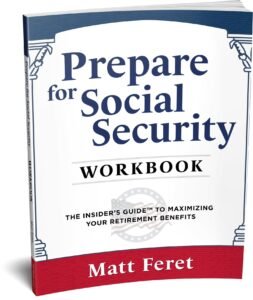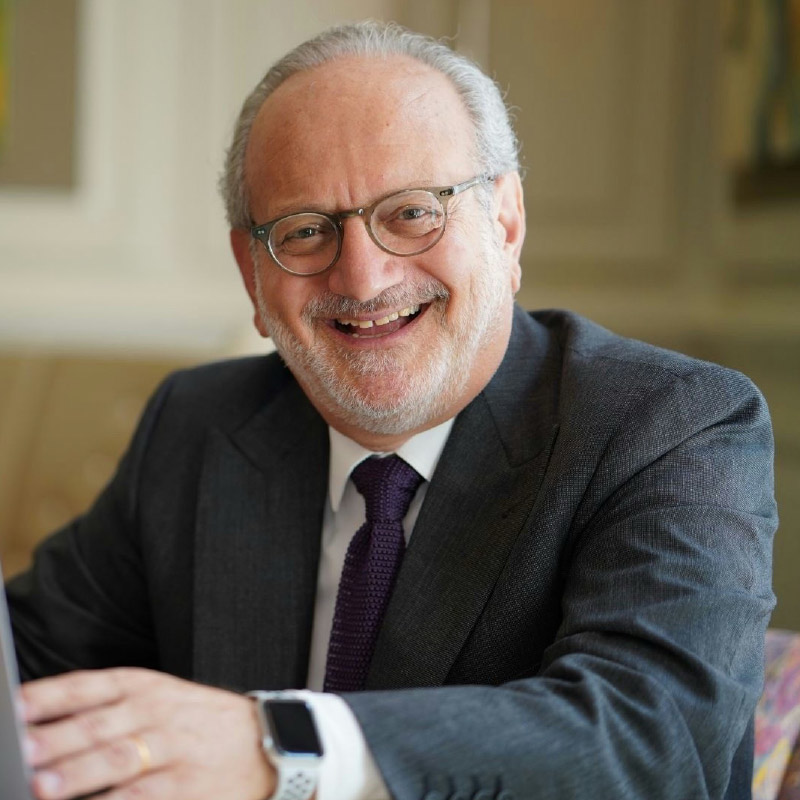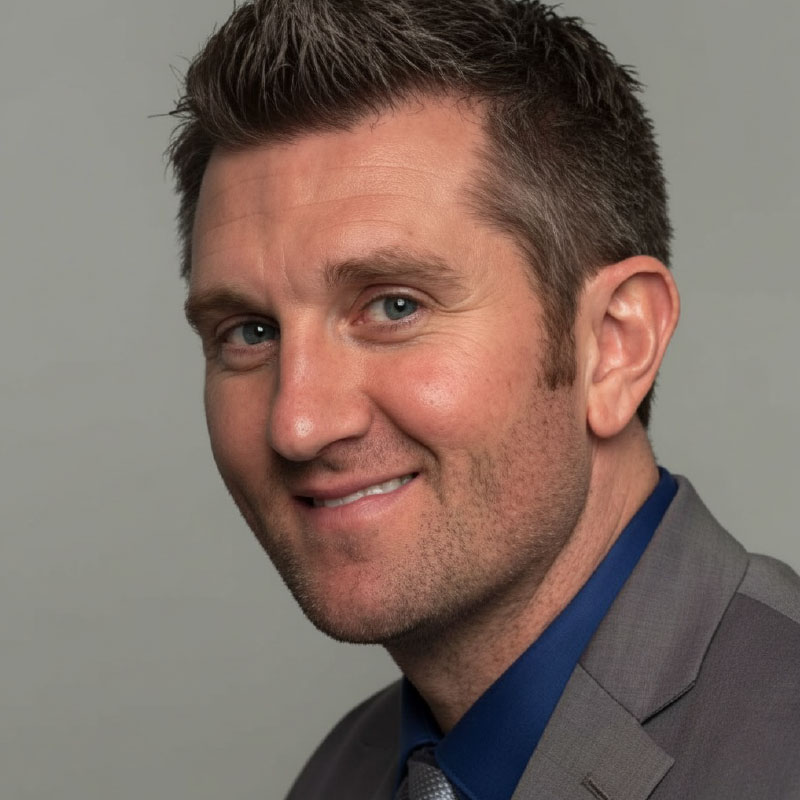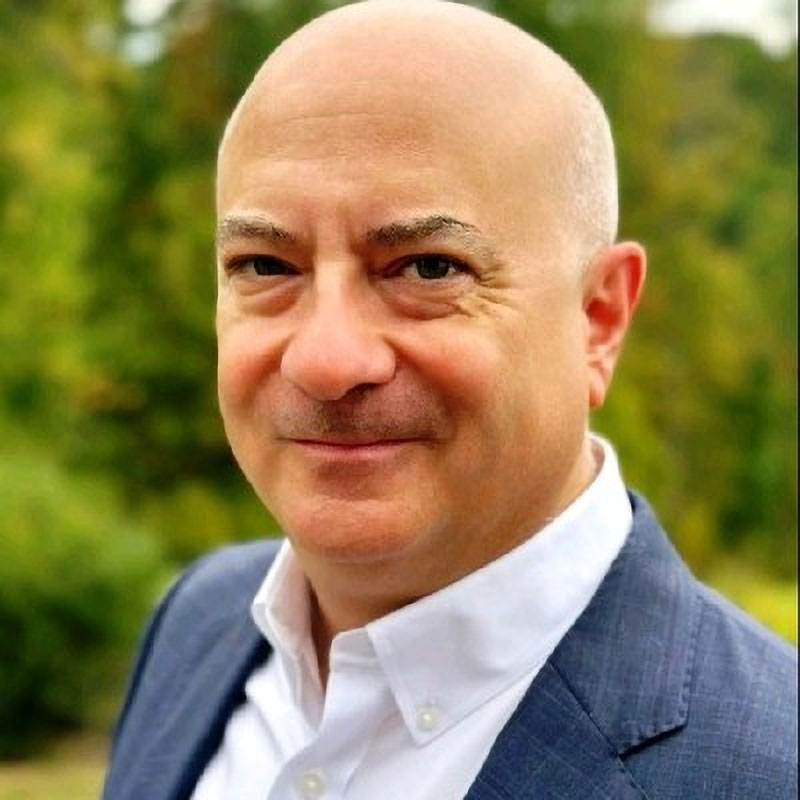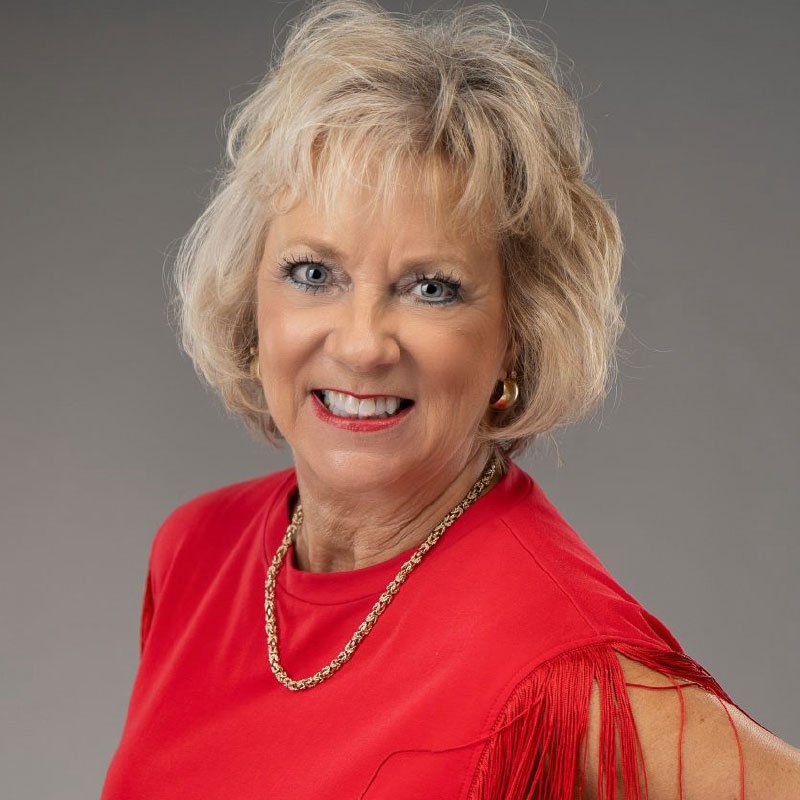#092
Share This:

Retirement is supposed to be a reward at the end of decades of hard work. It’s supposed to be the long-awaited time of relaxation and peace of mind. But what if it’s not? For countless retirees, that dream doesn’t match reality. The structure that once gave life rhythm — the routines, titles, and purpose that defined their days — vanishes overnight. What’s left is often an unsettling mix of confusion, boredom, and even despair.
Retirement planner and mindset mentor George Jerjian joins Matt to explain why this happens, and what retirees can do to avoid it. After years of helping people navigate this transition, George has seen how easy it is to “drift into oblivion” once the paychecks stop and the identity fades. In this episode, he breaks down the hidden dangers of traditional retirement, why financial planning alone isn’t enough, and how his DARE Method helps people rediscover meaning, purpose, and joy in the second half of life.
If you enjoyed this episode of The Matt Feret Show, you may also enjoy:
Listen to the episode on Apple Podcasts, Spotify, Deezer, Podcast Addict, Stitcher, Google Podcasts, Amazon Music, Alexa Flash Briefing, iHeart, Acast or on your favorite podcast platform. You can watch the interview on YouTube here.
Brought to you by Prepare for Medicare – The Insider’s Guide book series. Sign up for the Prepare for Medicare Newsletter, an exclusive subscription-only newsletter that delivers the inside scoop to help you stay up-to-date with your Medicare insurance coverage, highlight Medicare news you can use, and reminders for important dates throughout the year. When you sign up, you’ll immediately gain access to seven FREE Medicare checklists.
Quotes:
“Of course it's important and we need it. But when the focus is overly on the money, we're missing a trick here. And the thing is, our lives are very important. We don't realize this until we have a rendezvous with death, which I had. And so when you have a rendezvous with death, you suddenly realize that time is crucial. In fact, I'd go as far as to say that every single day is a new life. It's a new beginning. Because we're not guaranteed to get up in the morning tomorrow. In fact, some of us may not make it to the end of the day.”
-George Jerjian
“I'm telling you, if you lie to yourself long enough, you believe the lie. And then the ego comes in. Now, here's the thing though. What nobody tells you is the minute you retire, your identity is compromised. So let me lay it out as to how this works.”
-George Jerjian
“Go to a country or a place that you've always wanted to go and explore. And you will see things about yourself and about your own life from a different perspective. And that changes how you see things and how you think. So coming back to your point, travel is really important, grandkids and family hugely important, but you can still do both now.”
-George Jerjian
#092
Selected Link from the Episode:
Host’s Links:
All Things Medicare: prepareformedicare.com
Decoding Social Security: prepareforsocialsecurity.com
My Written Works on Amazon: www.amazon.com/stores/Matt-Feret/author/B09FM3L4WW
The Matt Feret Show YouTube: www.youtube.com/@themattferetshow
Network with me on LinkedIn: http://www.linkedin.com/in/mattferet
Follow me on X: twitter.com/feret_matt
See behind the scenes on Instagram: www.instagram.com/matt_feret/
Join our community on Facebook: www.facebook.com/themattferetshow/
Follow me on Instagram:Matt Feret (@matt_feret) • Instagram photos and videos
Guest Links:
Webpage: https://georgejerjian.com/
Linkedin: https://www.linkedin.com/in/georgejerjian/
Instagram: @georgejerjian
Youtube: @retirementrebellion
Full Show Transcript:
Matt Feret (00:00)
Hi everybody. Welcome to the show. My guest today is George Jurgin. He's a mindset mentor to retirees and he also spends a lot of time helping people find a new beginning.
On top of that, he's a three time author on this very topic. George, welcome to the show.
George Jerjian (00:21)
Great to be with you Matt.
Matt Feret (00:23)
Tell everybody what you do, I mean I just kinda told them, but in your own words, what you do and how long you've been doing it and how you help people.
George Jerjian (00:32)
I help retirees to find a new beginning. And why is that the case? Because retirement is not what it's supposed to be. ⁓ It's a dangerous place to be for retirees, particularly those who think that they've nailed it by having their financial plans all worked out tidily, because it's not about the money.
It's about your life. And drifting into oblivion is a very dangerous thing to do when you've got another 25 years potentially ahead of you. And no one tells us this.
Matt Feret (01:16)
You know, it's true. Everybody talks about 401Ks and IRAs and pensions and Medicare and Social Security and the timing, and it's all money-based. ⁓
Is it a gauntlet? I guess that is what you're talking about. Does that ring true for everyone regardless of whether or not they have two pennies to rub together or you know, two billion pennies to rub together if people find themselves at the same point no matter how much they've got or they don't have?
George Jerjian (01:50)
That's a tough question because the automatic thing is to say yes, but there are people who get on with their lives unknowingly. In other words, they've got the right attitude. They realize that retirement isn't what it was meant to be and they enjoy doing what they do and by default, they get it right. They're living their lives with meaning.
And so don't get me wrong, the money is important. It's energy. Of course it's important and we need it. But when the focus is overly on the money, we're missing a trick here. And the thing is, our lives are very important. We don't realize this until we have a rendezvous with death, which I had.
And so when you have a rendezvous with death, you suddenly realize that time is crucial. In fact, I'd go as far as to say that every single day is a new life. It's a new beginning. Because we're not guaranteed to get up in the morning tomorrow. In fact, some of us may not make it to the end of the day.
Statistically though, most of us will. And it's what kind of life do you want to be leading? Now, if you're set financially, that's kind of like a false sense of security because things can go wrong. And when things go wrong and you've been retired for 10 years, you can't exactly go back into the workforce.
Matt Feret (03:10)
That's it.
George Jerjian (03:37)
So you're a dead man walking. It's simple. So recognize that whatever money you've put aside is good. You haven't wasted your time. But recognize that whatever time you have left is precious. What do you want to do with that time?
Who do you want to become?
Matt Feret (04:05)
Do you ⁓ find people get there from a percentage standpoint? Do people get their financial affairs in order and quote unquote retire and then naturally move into this meeting and purpose and kind of the, now what? ⁓
versus the percentage of people that actually do the finances and then prepare to retire or prepare to do something more meaningful or more purposeful in retirement. What's the split in your experience?
George Jerjian (04:41)
I think the split is the vast majority of people don't know. And it's they don't know not because they're stupid. They don't know because they've got no idea what they're walking into. Retirement is a different country.
Who you are, or rather, who you were, is of no significance going forward. In other words, apart from you, nobody cares.
I mean, I'm being brutal, but to get to the point, you know, all the certificates you have in your office at home, all the cups and the things you've won, that's history. That's not who you are now. You've been stripped of who you were. And if you don't make a cognitive decision, even a spiritual decision as to who you want to be,
in this next chapter of your life. And by the way, this isn't medicine. This is supposed to be the best part of our lives. If only we believe it. We know from Cicero that old age is the crown of life. It's supposed to be the best part of our lives. But unfortunately, in the culture that we live in, age means the crepitude. means
You have been. You're over. Time out. Sayonara.
Matt Feret (06:19)
Yeah, it's kind of the only ism that's still allowed in Western society is ageism.
George Jerjian (06:23)
Absolutely, and it's rampant and I catch myself doing it. It will be because that's how we've been programmed. So what we need above everything else right is a mindset change and I mean I'm gonna quote Plato Two and a half thousand years ago, right? I mean the guy either got a download or he was a genius. He said
Reality is created by the mind. We can change our reality by changing our mind.
But I'll give you another quote. Henry Ford said, thinking is the hardest thing to do. That's why so few of us engage in it. All right? And it's some.
Matt Feret (07:14)
Yep, we've got
Henry Ford, Cicero and Plato. This is a who's ⁓ who. ⁓
George Jerjian (07:17)
It is. I mean, these guys
were telling us about what we're facing.
And yet, we're too comfortable and complacent and we think we can ride this through. I mean, our ego, do you know who I am? Do you know what I have achieved? Nobody cares. Really, nobody cares. And what we don't realize is that our identity is compromised. There are studies done in this.
There was Harvard professor, Theresa Amabile, who talked about identity bridging. What she meant by that was when you meet people, retired people at say a drinks party or whatever, they'll tell you they're a retired lawyer or a retired CEO, right? And maybe even a retired janitor. I don't know, but the point is,
Matt Feret (08:16)
All
because they're still identifying
with their prior title and or accomplishments.
George Jerjian (08:24)
Yeah,
because they know they're nobodies now. So they're bridging to what they used to be. So internally, you can see they're identifying with this emptiness in their life. And we humans were not meant to be empty. So in retirement, and I was semi-retired for nine years, so I know.
Matt Feret (08:51)
Yeah, I was gonna say that you gotta get to the how did you get here piece. Well, we're gonna get to that very soon, I hope.
George Jerjian (08:57)
Yeah, well, we could go anywhere with this talk. ⁓
Matt Feret (09:01)
Yeah, no,
but how did you get? How did you get to the place you mentioned it briefly in the beginning? You had a brush with death. So tell tell me the story.
George Jerjian (09:07)
I did, I did. Okay,
first of all, I knew nothing about retirement. At 52, age 52, I was diagnosed with a bone tumor. And the oncologist said bone tumors are generally 98 % of cases of bone tumor. It's secondary cancer, which means it's spread throughout your body. So he gave me six months.
talk about a punch in the face. And my reaction, I laughed it off. I said, it's not happening to me, it's happening to him.
Matt Feret (09:44)
You just disassociated yourself. Wow.
George Jerjian (09:45)
You disassociate.
We have ways of deluding ourselves. We're very good at that. And so for like three and a half weeks or so while I was undergoing tests, I had this sword of Damocles on my head. The guy said 98%.
Three and a half weeks later, I discovered I belonged to the 2 % club. Mine was benign, localized, highly aggressive, required two operations. So I was, my death sentence was commuted to six months recuperation and learning how to walk again. And so I took a philosophy class and, online and I had a lot of time to think and I realized
I'm semi-retiring, I'm shutting things down, I want to reassess my life. Time is suddenly the really important factor in the equation here, not money. And again, I repeat, money's important, don't get me wrong. But money, there's a possibility of making money again. There's no possibility of getting time back. That's the difference. Now, so you kind of have to balance the two.
And so I semi-retired. I got rid of anything that was in my life that was not worth the hassle. And I semi-retired for nine years. I drifted slowly into oblivion. I was unhappy, unfulfilled, waiting for other people.
Matt Feret (11:31)
Okay.
George Jerjian (11:35)
It just got so miserable that after nine years I decided I had to take action.
Matt Feret (11:38)
Yeah.
Yeah, hold on break that down just for a second. you hung humming along in life, age 52 cancer diagnosis, reassessment, right? Thank God you're here. It was benign. Well, it was aggressive. So it wasn't benign, but you got it. You got it solved. You're in the lucky 2%.
Now I would imagine some people listening or watching would say, new lease on life and you would appreciate every day, every day you woke up, right? The old saying, ⁓ nobody should ever be waking up on the wrong side of the bed. You woke up, some people didn't.
It's a good day automatically. Right? How? Why is it that you so you semi retired? In other words, you put time before money or some semblance of that? Why do you think you went into some sort of drifting? I'll use the word depression. You didn't. Why did you? Why did you drift for nine years? Or was it was it you wanted to find meaning? If time was so important? And you realize that getting cancer at age 52? Why do you think you drifted for nine years? What were you trying to figure out?
George Jerjian (12:47)
Okay, I didn't know that you could reinvent yourself. I was in a box of 52, early retirement. What do you do? Everybody retires and what happens? I'm no genius. I just followed. I did what I thought was the right thing. It's only when my pain of irrelevance, pain of...
being unfulfilled, having no joy in my life, having no reason to jump out of bed. Although, paradoxically, I knew that every day I was living on bonus time.
Right? I mean, I'd just been given a new lease of life, so I know every day. But at the same time, I didn't have the capacity, the knowledge to break free out of the imprisonment of this diktat that after a certain age, you're now into the retirement phase. I just happened to be earlier. And what do you do?
Listen, I'm no genius, I'm a slow learner. It took me a while to wake up and I would say that it wasn't even intelligence, it was misery that got me to say, I need to tear up this rule book. I need to do something different. I need to find out what I'm supposed to be doing with my life. And that's where I got involved in finding this ⁓ retreat where
It was a spiritual retreat, a 30-day silent retreat to go deep within because I knew the answer did not lie outside of me. It was within as it is for all of us and each of us. So to your audience, I would say, don't look for the answer outside of you. There's no genius out there who's going to tell you how to lead your life. Only you have the answer.
Matt Feret (14:34)
I've heard of those.
George Jerjian (14:59)
If you can...
spend the time to drill down and excavate under the crap that we've built up over our lives and the lies that we lie to ourselves just to get on.
So it's about finding not just your purpose, but finding your higher self, who you are and who you wanna be going out before the lights go out.
Matt Feret (15:31)
So when you went through nine years of...
George Jerjian (15:35)
Semi-retirement.
Matt Feret (15:37)
semi retirement, but knowing that you needed to do some work, or not maybe not knowing you didn't need to do some work, but then coming to that conclusion. What was your aha moment? What was the, you know, before you went on a 30 day? ⁓ What was it not speak? What was it called a 30 day? I can't imagine not talking for 30 days, much less 3030. You'll have to tell us a little bit how that went. But either which way that that seems like a ⁓
George Jerjian (15:54)
30-day silent retreat.
Matt Feret (16:06)
You know, that's a I'll use the word extreme. I don't mean that in its typical sense. You must have gotten to a point where you're like, I think I've got it, but I really know I need some help. And this is one of the answers I got. How did you what was your moment that you were like, you know, gosh, darn it. It's been nine years or eight and a half years. this is the level at which I need to go through in my life to help answer this question for me. What was your what was your moment of just maybe exasperation or ⁓
realization that made you go, I have to go do something. maybe for some people, it's a 30 day retreat. And maybe for others, it's different. What was that time when your brain where you're like, man, I got to get this solved?
George Jerjian (16:50)
I think there's one word, despair.
when you reach the point of despair.
I knew the remedy was something that would demand a great deal out of me. I was brought up a Catholic, went to Catholic school, and ⁓ at some point in my growing up, I even wanted to be a priest until I realized that I liked girls too much and sex was gonna feature very high in my life, so that wasn't gonna work.
But there was a part of me that... ⁓
wanted some strong spirituality. I needed some spiritual anchor. And I wanted to go deep inside. And I'd always heard about this 30-day silent retreat, but I thought, nah, I like talking too much and this isn't gonna work. But there was a part of me that wanted that challenge. I needed a breakthrough and I wasn't gonna get it by
you know, going sort of ⁓ to fortnightly or weekly therapy sessions, it had to be something deep. And I knew nobody out there was gonna tell me what I needed to do. Only I could find that out, but I had to go on what I call an inside adventure or an inventure. But despair was what drove me to that.
Matt Feret (18:33)
is interesting because if if you know anybody listening or watching is not yet retired or semi retired. ⁓ I don't know that
don't know, despair is a sad word.
Um, you know, if you're, if you're, if you're looking from the outside in, if you have the financial means to retire or semi retire at age 52, that's, you the whole fire movement, right? Financial independence retire early has been pushing for 15 years to do just that, which is earn enough, save 80 % of your paycheck, and then get out of the rat race early. And what you're saying is you were, you went into this and you were, you were in despair, not, you know, this, this pleasure that I think everybody
Matt Feret (19:18)
of retiring before 65 or 70 of just bliss. ⁓ Do you think that's more common or less common?
George Jerjian (19:26)
I think it's much more common than people will admit. ⁓ Don't forget, to actually admit that your retirement sucks is a huge leap, right? And it's a...
Matt Feret (19:42)
Yeah, because everybody else
who's still working is looking at you with jealousy and can't wait to get there. But you know, just one more year or just a couple more thousand bucks in the retirement plan.
George Jerjian (19:53)
I'm telling you, if you lie to yourself long enough, you believe the lie. And then the ego comes in. Now, here's the thing though. What nobody tells you is the minute you retire, your identity is compromised. So let me lay it out as to how this works. As soon as your identity is compromised, right? It's not just your friends who turn
Matt Feret (20:12)
please.
George Jerjian (20:24)
or don't give you as much time as before. Your own family, your own partner. Why? Not because they're bad people, but because now you've chosen to be a nobody.
And at home, you think, well, I've paid the mortgage here for the last 30 years, I think I have a say. ⁓ really? No, you don't. Your partner has a say. Suddenly now, you think you can fix things in the house. That's not gonna work. Trust me, it's not gonna work.
Matt Feret (21:05)
Why is that? Is it because not only do you self-identify with your work, your job, your title, your paycheck, the business that you started, but you're saying your friends and your partners do too. And so when that changes, they look at you through a different lens.
George Jerjian (21:24)
Yes, but it's not just that. It's that you're now a nobody walking around and interfering in other people's lives. I mean, let's be honest. Listen, if you're not busy doing something creative, if you're not busy in being socially and mentally engaged, you're drifting into oblivion. Literally, your mind
Matt Feret (21:35)
I see it. mean, I understand it.
George Jerjian (21:53)
starts to disengage. You don't have anything interesting to contribute to friends.
and in your own family, you're getting in the way. You're spending too much time. Before it was like they'd see you for a couple of hours a day, maybe, you the weekend. Now they see you 24-7? Shoot me.
That's the ugly reality of retirement. So it's not about blame. It's about everybody needs to be doing something that's worthwhile, that's meaningful. And in a sense, life is challenging retirees to say, who am I going to be now? So it's about a new identity and...
of what service can I be?
without comparing who you were before and your paycheck. Because whatever you're gonna do now, and I'm not saying that you can't make more, because it's not about making, it's about being. Who are you going to be in this next chapter of your life? And to do that, you need to go on an inward journey. Now,
I'm not saying you have to do a 30-day silent retreat. I'll spare you that.
Matt Feret (23:24)
gonna
I still don't think I could do it even if I even if I needed it I don't know that I could do it so thank goodness but where do you start yeah where to start and when to start I mean I would I assume you're going to say start it before you retire but for you know in your instance you were you had cancer and you almost died
George Jerjian (23:28)
But you but
Yep.
Yep.
Matt Feret (23:44)
And it was forced upon you in some sense of the word. So is the best time to is quote unquote now or is it years ahead, months ahead or give yourself six months after you retire and then then go on this journey.
George Jerjian (23:58)
I would say that there's many ways you can do this, but there's no harm in starting early because it takes time to make that transition.
And so, ⁓ remember, it's about finding who you want to be in the next chapter. So this isn't something, some people are very fortunate and they find it very quickly. ⁓ For others, they need to do some work, as I did, to find out who I wanted to be and what I wanted to do.
And I really love what I do and I never thought that teaching would be one of my, you know, I'm a marketing guy, I was in commercial real estate, I did all sorts of things. ⁓ I funded litigation. I mean, I did a lot of stuff, but teaching, although this is where I think I've come into my own. I love doing this stuff. I love learning and I love teaching.
I'm fully engaged mentally and socially. And I'm helping people.
Matt Feret (25:17)
It seems like and helping people obviously is what I love too and I know that. But it seems that, I don't know, this seems hard to me. I guess maybe I'm personalizing it but it's my show so I can do it. That would be hard for me. The easy part for me would be to talk about the money. Do I have the appropriate mix of stocks and bonds?
in my retirement accounts, right? Is my car over 100,000 miles? I mean, it's those things that for me are easy. I think the hard piece is going to be when that day comes or even starting before that day comes is doing that self discovery that introspection. So for a guy like me, how do you coach people to become comfortable with even broaching that topic? Because it's scary.
George Jerjian (26:07)
It is scary, but
listen, I'll tell you what's scarier. Having to address this on your deathbed, because it's kind of too late then. Right? So, you have a choice. ⁓ You could just drift into oblivion and have to face that question on your deathbed, like, ⁓ shit, I didn't live the life I wanted to live. ⁓ Sorry, time's up, Brad Pitt's outside. ⁓
He's taking you away.
Matt Feret (26:39)
Yeah, that's not something I would want to do.
George Jerjian (26:40)
⁓ No, nobody
does. And so in a sense, while you're still in a strong position, recognize that you need to be investing in yourself, because that's what this is, right? And I have a very easy process, which I have, if you like, put together, not just from my experience, but also from learning how other people have done it in the past.
⁓ And it's called the dare method. And the dare method, if I can segue into this, because I know you wanted to talk about this. Well, conceptually, dare is another word for courage. And courage comes from the Latin core, meaning heart. Now, why is this important? Because we need courage to un-retire.
Matt Feret (27:17)
Please. I do.
George Jerjian (27:39)
and find a new beginning. It's so much easier to be complacent and just go with the flow and let it end where it's gonna end. But with 25 years to go, you need to rethink this equation. so, dare is to have courage. But dare has another aspect, is that...
Courage is not an intellectual faculty. It's an emotional faculty. It's a heart decision. Something we're not used to in our culture. Everything's gotta be logical. But even Einstein said, right, the intuitive mind is the master and the rational mind is its servant. But we live in a society that
Matt Feret (28:17)
Mm-hmm.
George Jerjian (28:30)
worships the rational mind and ignores the intuitive. And so what I'm saying is the answer lies within each of us in our own hearts. And that's the journey we need to go in. Now it's a very short distance between the intellectual mind and the emotional mind. It's less than eight inches, but it's like 8,000 miles, let me tell you. Right? Because it's a very circuitous route.
We have minefields that stop us going to places we don't want to go. So one of the questions I ask people, I'm I'm digressing here a little bit, is what are you most afraid of? Because for a lot of people, the answer they want is right behind that.
Matt Feret (29:23)
What kind of answers do you normally get? Failure? Running out of money? Yeah, what do you get?
George Jerjian (29:23)
And that takes courage.
No, it's something that
when they were younger, they wanted to do something. And the whole idea was demolished in their heads for them by the people who care for you most. You got to make a living, kid. All right? So that's one aspect. Yes, you will starve, boy. Okay, you know what I'm talking about. So you need to revisit that. And for that,
Matt Feret (29:43)
I gotcha. I wanna, but I want to sing!
you
I do, yeah.
George Jerjian (29:57)
you know, there are exercises I have that do an audit on your life, which is what part of the sort of spiritual retreat was all about, which I've kind of brought some of those ⁓ exercises into this. But so there is the method and there is also an acronym for discover, assimilate, rewire and expand.
Matt Feret (30:03)
Okay.
George Jerjian (30:25)
The discover is about discovering what retirement is and what it's not.
A is to assimilate new information about how our mind works, particularly our subconscious mind, which works very differently to the conscious mind.
And we don't have time to go into it, but essentially it's about understand. Once you understand how your mind actually works, it changes the whole way you look at things. The next word, are, is to rewire. How do you rewire your mind? How do you rewire the inner dialogue that's always in the background there? You're too old to start them. You can't take the risks now.
you don't have enough and all the fears start being played, right? Well, you need to change that inner dialogue because it's not real. It's programmed. And we're making decisions based on that programming. That's what Henry Ford meant by thinking is the hardest thing to do. That's why so few people engage in it. We don't wanna go there.
Matt Feret (31:26)
yeah.
George Jerjian (31:49)
And actually, it's emotions. It's not even the mind. The thoughts, the fear thoughts, are just emotions being played. And so you have to record over it like a tape recorder back in the day, if you remember. You could record over it, right? That's essentially what you're doing with the rewiring. And lastly, expand. Expand because it's counterintuitive. In retirement, we don't expand.
Matt Feret (32:07)
Mm-hmm.
George Jerjian (32:19)
We shrink, we shrink everything, costs, our homes, our assets, cut, cut, cut, our sandbox gets smaller and smaller, and then we wonder why we're drifting into oblivion.
It's counterintuitive, we need to expand. How do you expand? One of the ways, very powerful neuroscientific ways is gratitude. When you're grateful for what you already have, it allows you to open up to bringing in bigger things and new things into your life. Richer things, and by richer, I don't mean necessarily monetarily, I'm talking about richer things in terms of
the service you provide, the fulfillment you get, the friendships you create. There's so many things that play into this. And, you know, I've even studied ⁓ the German philosopher Martin Heidegger who
said that thinking and thanking are not just linguistically connected, they come from the same proto-German root, but they're neurologically connected.
When you're thankful, it opens up so many doors for you because people love you. Because you're grateful for things, right? People love people who are grateful. Nobody likes people who are sort of discontented all the time and miserable. So that's the dare method in essence.
Matt Feret (33:54)
Right.
Yeah, and I want you to I want you to walk me through it if you don't mind. Obviously, we don't we don't have time for you to take me through an entire session. But but isn't it before we do it, isn't it easier, though, to to make a bucket list or to go travel or or or play with the grandkids or ⁓ I don't know, get a job at the local hardware store. ⁓ And I'm setting this up because those are all their distractions, right? They're not really answering the essence. And I have to imagine ⁓
George Jerjian (34:04)
No, sure.
Matt Feret (34:31)
You know the fulfillment piece and the meaning piece you can do all these things But it's not going to get to anything past well I guess I'll go to the hardware store today and and ⁓ I suspect you're gonna tell me it's gonna be the same journey But that's what most people read and hear and see right
George Jerjian (34:39)
Yeah.
Yeah.
Well, again, as I said, it's because we're in that box of self imprisonment. We're in the prison of our own minds and we don't even recognise or realise it. So to address your point, grandkids, lovely. Why can't you do both? Seriously, that's number one. Number two, travel, absolutely important.
and travel with an intention. And that brings me to my book, Odyssey of an Elder, Around the World in 80 Days, which is what I did, not just to inspire myself, but to walk my talk. And that's one of the things I advise retirees is, once they do my exercises is, know, go away to a new place, a place of your choice. You don't have to do what I did. You've got your own dreams. That's what you need to be doing.
Go to a country or a place that you've always wanted to go and explore. And you will see things about yourself and about your own life from a different perspective. And that changes how you see things and how you think. So coming back to your point, travel is really important, grandkids and family hugely important, but you can still do both now.
the hardware store, that's the one I love. So let me address that. Most people when they retire, they kind of look for work in the same kind of area or near enough to what they used to do. Nobody wants you back there.
Matt Feret (36:34)
Nobody wants you anymore.
George Jerjian (36:35)
Nobody wants you back there. But wait, no, wait, wait,
but no, you don't want to go back there. But you're forcing yourself to go back because that's the least painful way to go. But let me tell you, you are choosing the hardest road. So that's if you go back to the kind of places you used to work in. But if you go to the hardware store, shoot me right now.
Matt Feret (36:42)
Yeah, you just retired, right?
George Jerjian (37:04)
Let me tell you, working at jobs that you hate is going to kill you from the inside.
Choose something you love to do.
even if you don't get paid a lot. Because believe me, doing something you love to do changes the whole dynamics. First of all, you come back home, you've got a smile on your face. Do you think your partner and your kids are not gonna notice that?
but that takes courage. So forget the hardware store, forget about trying to get back into the kind of work that you used to do. You're a new person now, new identity, new future. Carve it out. Dream it and you can bring it into existence.
Matt Feret (37:57)
So let's do that really well, again, not quickly, because we wanna give it as much time as we need, but just briefly, let's go through each one of the DARE. Can we do that just briefly, just for a preview? And I know you have all sorts of ⁓ resources that we should talk about. Would you like to talk about them right now? And then we can do a DARE.
George Jerjian (38:10)
Okay.
Okay, how do you want me to split this? Let me explain. I have a one hour free ⁓ module with three exercises available on my website. So the dare is explained fully in there and you get three exercises to help you, if you like, get a feel, a taster of what's ahead. Apart from that, what would you like me to do now for your audience?
in terms of the dare.
Matt Feret (38:48)
⁓
How about a little, I don't know this is, I know you can't condense an hour into 10 minutes or five minutes, but just give maybe a preview. Use me as your subject, how about that? I am your willing subject. ⁓ Take me through just a quick preview of the D-A-R-E. ⁓
George Jerjian (38:58)
I'll try.
Okay, all right.
Okay,
the DARE method is broken into eight modules, two for each of those letters. So ⁓ in the first one, discover what retirement is and what it's not. I give you a history of retirement.
And it's important to know the history because otherwise you're living in a vacuum. You don't know where you're coming or going. If you understand who created retirement, why they created it, right? And I go back to Caesar Augustus. He created it for the Imperial Roman army to make sure no one assassinated him like they assassinated his uncle, Julius Caesar, right? And he got their loyalty.
Matt Feret (39:53)
Yeah. ⁓
George Jerjian (39:55)
because they all were looked after in retirement. And he put in 600,000 cisterci of his own family's money, which was a huge amount of money. And it grew into an incredible ⁓ fund, so much so that within the lives of two Caesars, the Roman Senate was kept on taking money out, not dissimilar to...
how the US government has over the past three decades or five decades ⁓ taken money out of the social security system. Same thing. There's nothing new under the sun. My point is that retirement, the history of it, when you understand it, it makes you realize that it's just the house of cards. The money is great, it's important, but
Don't put too much reliance on it. Things can go south. You've seen valuations on your pension funds can go up and down. And what with the economic situation now, and I'm not going to get political, things can go south pretty quickly. So money's important, but it's not your life.
and it's understanding that mindset, putting things in, recalibrating. That's why I talk about the history. And there's a history about how all the defined benefit pension funds in corporations were literally suctioned off.
companies were going bust. They all had to put their fingers into the pension funds. We're not unfunded. They're in huge debts by billions. So the history is important because it clears any foggy illusions you may have ⁓ about how other people are going to look after you. No, they're not. You need to look after yourself.
Matt Feret (41:44)
Mm hmm. And now the pension funds are unfunded. And now they'll issue. Yeah, and that's
George Jerjian (42:07)
but in a good way, not in a negative way. So that's D. And there's exercises with each of these eight modules. So the first ones will have doing an audit on your life. That's hugely important because I did an audit on my life and I chose to look at the houses I'd lived in and all the good things that happened in those houses and all the not so good things.
And when I was in that retreat, that silent retreat, I had time to evaluate because I was completely cut off from the world. I was focused on my journey. And what I discovered was that none of the good things would have happened in my life without the preceding crises. And so I wrote a book, Spirit of Gratitude, Crises are Opportunities. Now, why is that important?
You'd think it's obvious, but it's not. It wasn't to me. We need to be grateful for the things that, the bad things that happened to our lives because it opens us up to new opportunities, right? And in a sense, retirement is a crisis in the true sense of the word. It's a turning point. It's a pivot. And for most of us,
We hate the idea. That's why people don't want to retire if they can help it.
but it's something that you have to go through. And there's a lot of benefits. And so I'm digressing a little bit here, but the point I'm making is that...
My spirit of gratitude journey was being grateful for the challenge that we now face in retirement. And so you wanna look at it from that way. You don't wanna go kicking and screaming into this place. You wanna go recognizing that it's gonna be arduous, it's gonna be challenging, but in a good way. You're gonna grow through this, right? Instead of staying where you are, which is comfortable, right? It's almost like,
in adolescence, you wanna stay at school because you don't wanna go out into the world, how's that work? Right? Although when we're younger, we wanna get out into the world, but that's another story. This time.
Matt Feret (44:35)
All
Yeah, we I was gonna
say try to equate this. Is there another time in people's lives that you can equate this to? mean, if it's ⁓ I mean, think about what many people have already been through marriage, divorce, remarriage, children, death, sickness, ⁓ new careers, new jobs, big promotions, getting fired. I mean, there's a lot by this stage that you have. Yeah.
George Jerjian (45:02)
That's exactly my point.
Matt, that's exactly my point is that we've already been through many of these iterations and each time, you know, it's a bad outcome. But take out a few years out, you look back and it was the best thing that could have happened to you because you wouldn't have found the new thing that you're into, that you love or whatever. And so my point is that
Retirement is a rite of passage, probably more crucial than the in-between stuff. But in adolescence, we take a gap year. And, well, not all of us, I didn't, but ⁓ kids, it sounded great and people did it. And in fact, I think the people, the young people who take gap years develop much more quickly because
Matt Feret (45:49)
I didn't either, but it sounded great.
George Jerjian (46:02)
and they get a new perspective on life, not just on the life outside, but on their own inner feelings about things. And it opens them up ⁓ because it's a rite of passage. Whereas in old age, when you stop work, we have no rite of passage in our culture. And in a sense, I introduce this gap year for elders.
because it's a way of integrating this closure to the working life that we had before. But it's not the end. It's a new chapter that's gonna take us for the next 25 years. Don't you wanna invest in yourself to prepare you for this next stage that you're gonna go on? It's daunting to do it on your own, but when you've got somebody holding your hand and helping you make that move,
It's just so much easier.
Matt Feret (47:05)
I love that, a gap year, a gap year in retirement.
Think of all the things you could do. You don't even have to, I mean, now my brain's going a little crazy with this. I mean, if I just had a gap year between work and retirement, that I didn't feel like I had the responsibility to immediately be productive or immediately do something new or immediately start volunteering or immediately starting to see my kids more, but I've got a year to figure it out and just giving myself or having someone give me permission to give myself a year, a gap year.
George Jerjian (47:42)
But here's the thing. First of all, it doesn't have to be a whole year. Let me just put it out there. you, hey listen, if you want to, that's fine. But what I'm trying to say is that.
Matt Feret (47:43)
I love that.
Okay. I mean, I want a whole year, but okay, I what you're saying. I'll take a year.
George Jerjian (47:59)
We all have older parents that we need to look after, but these are all negotiable. Don't use other people as an excuse not to take responsibility for your life going forward.
Matt Feret (48:15)
So easy to do, George. So you just said that. If you've got parents, you've got parents you gotta take care of or grandkids that need, there's so many ways to not do this and distract yourself.
George Jerjian (48:18)
We all do it.
Absolutely. And be aware, these are excuses we make to ourselves. Before I went on my 80 days around the world trip, I have a 90 plus year old mom who has dementia, full onset of dementia. And I was nervous about going because if she died, what am I, I'd have to cut my trip, things could go wrong.
I went, I came back. I was gonna miss that, right? And those are genuine fears that I had. I went, I came back, she's still here.
Matt Feret (48:56)
You wouldn't be there in her last moments. mean that, yep, yep.
George Jerjian (49:09)
Could it have gone otherwise? Yes. But what I'm saying is that we put such little value on our own lives by making excuses, right? And the excuse is that...
We actually believe the excuses because it sounds like, yeah, that sounds right. But your life is incredibly valuable. And if you want to use the Christian adage, ⁓ love your, was it? ⁓
Matt Feret (49:46)
Yeah, love your neighbor as themselves, yeah.
George Jerjian (49:46)
Love your
neighbor, thank you, that's the one I was looking for. Love your neighbor as yourself. I actually turned that on its head. How can you love your neighbor if you don't love yourself first? It's an equation. It doesn't say love your neighbor, period. It says love your neighbor as yourself. But I have a rationale as to why that's happened.
Our consumer society, advertising, makes us discontented with what we have so that we can go and buy whatever it is that we're going to buy. And it's slow drip-feeding poison. We always feel inadequate. We don't feel worthy. Think about it. That's why we don't love ourselves. I'm not handsome enough. I'm not good-looking enough.
you know, is my bum big or whatever it is that you want to create.
Matt Feret (50:44)
Do
Do I have the right education? I'm not smart enough. ⁓ Yeah, I don't have enough money. ⁓ I don't have. Yeah, plenty of that.
George Jerjian (50:47)
Yes. Yeah.
There's so many reasons
why we don't love ourselves, right? And if we have that, if we're in that emotional state of not loving ourselves, we can't genuinely love our neighbor. That's simple as that. So if you actually want to lead a good life, a Christian life or whatever it is that you follow, you need to love yourself first. That's a prerequisite. ⁓ It's almost a no brainer.
Matt Feret (51:23)
And what you're equating that to is allowing yourself that gap year and allowing yourself because you deserve it and and allowing yourself to actually go beyond the checklist or the bucket list or the well now I'm retired I have more time to do this it's allowing yourself and loving yourself enough to allow you to give yourself that time away from everyone everything mean heck you you went to a
George Jerjian (51:27)
because you deserve it. You've earned it.
Yes, correct.
Matt Feret (51:52)
A silent retreat. I mean, you talk about extremes, right? You literally went away and didn't talk for 30 days. ⁓ But allowing yourself to do that, ⁓ to love yourself enough to do that. That's an interesting way of thinking about that.
George Jerjian (52:06)
I'd add something else to this is that ⁓ we think that by going away, I lost my thread there. ⁓ I just.
We deserve, if we don't take that gap year immediately after our retirement, right, from our work, and we postpone it, you'll never do it. Something's gonna come up and you're not gonna be able to do it from that point on. I was 69 when I did my trip. I was able to get insurance to do my round the world trip. If I waited one more year at 70, I would not have been insurable.
Matt Feret (52:20)
No, we were talking.
George Jerjian (52:49)
to travel around the world. I could have gone for one destination, come back and go out again, but not around the world because the chances of me falling, breaking something, being shipped back. So what I'm saying is don't think you have all the time in the world to do the things that you really wanna do. This is the time to do it and it's perfectly timed because
It's gonna give you the answers to everything you wanna be thinking about and doing for the next 25 years or whatever time you have left on this planet.
Matt Feret (53:29)
It's a really important point that I think a lot of people miss, which is that there are ages and stages for activities that will sunset. I have a friend who has done a wonderful job of living life.
moved to where he wanted to move, moved to where he wanted to live, and then just found a job. I mean, the guy was incredibly, multiple degrees, incredibly talented. And what he did was he said, I want to live here and I'll just find a job. And he's gone on some amazing trips and taken his children on some amazing trips. And at one point he emailed me, we talked back and forth every few months via email and he goes, you can work in a wheelchair.
You know, I guess you can go sit at Walmart or sit at that hardware store in a wheelchair and make money, but you're going to age out of things. You're not going to be able to hike the Appalachian Trail when you're 70. So if that's what you want to do, you want to hike the Appalachian Trail or, you know, you want to...
George Jerjian (54:28)
correct.
Matt Feret (54:34)
do a grand tour of the world, there's a limited amount of time to do that. And ⁓ if you don't think about what you want to do and the purpose, it will pass you by and you'll wake up and realize you'll be 70 and go, yeah, I physically can't do this anymore.
George Jerjian (54:53)
or your kids won't let you. ⁓ There's all possibilities. I'd like to finish off with one thing about why travel is so important. And as I said, you don't have to go around the world. You can just choose one place and you don't even have to leave your country. You can choose where you wanna go. The quote I have is from Paolo Coelho who wrote The Alchemist. I don't know if you remember.
Matt Feret (54:55)
Haha!
Yes, please.
I do remember the title, not the author's
George Jerjian (55:24)
The Alchemist, it's about a guy who goes on
the journey, he comes back, he's transformed, and he sees his own home, town, changed in his own perspective. And Paolo Coelho has this beautiful quote which actually summarizes my journey. And he says, and I quote, maybe the journey is not about becoming anything. Maybe it's about unbecoming everything
that isn't really you, so that you can become who you were meant to be in the first place.
Matt Feret (56:06)
Well, thank you for sharing that. That hit me pretty hard. That's a great quote.
George Jerjian (56:13)
I think it's just, that hit me. mean, that's also one of the reasons why I did do what I did, traveling around in 80 days, because that was a book I read as a kid, the Jules Verne book, and I fell in love with it, and I wanted to do that, but life got in the way. So was fortunate enough to be able to have the chance to actually do it ⁓ as my gap year, 80 days.
Matt Feret (56:29)
Yeah, yeah, but you
Gap year, the dare method, how do we find you on the internet or in this world? You mentioned your website and you mentioned there's some free things there. Tell me how I can find you and your books ⁓ and yeah, share that please.
George Jerjian (56:57)
Okay, my website is georgejurgeon.com and ⁓ my social media is georgejurgeon or retirementrebellion.
⁓ I'm not sure it's just Georgian or retirement rebellion. You'll be able to access Instagram YouTube LinkedIn ⁓ Twitter Whatever anyway, it's all there and ⁓ And there's a free course for you so that you get a taster of What you Can learn from this next stage in life, which I hope will help you
Matt Feret (57:41)
And I'll have all those links on the show page in the show notes as well, just in case anybody forgets it. And tell me what type of courses, I how many ⁓ are there and what topics and just give me a quick preview if you don't mind.
George Jerjian (57:44)
Thanks, Matt. Appreciate it.
Okay, I have my free taster course, which is one hour. I have a pre-recorded digital course for eight weeks and it's strip fed each week with exercises, but it's all pre-recorded. I think it's, if memory serves, about $298. And then there's the live eight week course with me for 90 minutes each week for eight weeks.
which is just under $3,000. And lastly, it's not on yet, but that's something I'm hoping to do next year is to do a retreat, a one week retreat with 12 people. So intimate, ⁓ in the UK in the first instance, but then we'll choose different locations each year or maybe more. We'll see how it goes.
Matt Feret (58:35)
Mm-hmm.
Good luck with that.
I have to think there's more than 12 people that would be interested in that for sure. Yeah, George, this has been a real pleasure and I'm gonna stop this recording and have a little bit to think about myself. I really appreciate the time you spent with me.
George Jerjian (59:07)
My pleasure, Matt. It's been fun for me. Thank you.
Matt Feret (59:10)
Thank you.
All right now.



